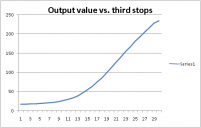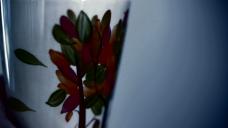
It allows to keep PV going, with more focus towards AI, but keeping be one of the few truly independent places.
-
This discussion was created from comments split from: Official GH2 "Stalin" hack development topic.
-
I'm very appreciative of @balazer for taking the time to look into this. I'm learning a lot from all of the ongoing discussion as well. I agree that gradient banding can be a relatively minor issue so long as story and overall cinematography is creative and on point. I am in my infancy in terms of learning the more technical aspects. I'll probably look into the zone system and experiment with exposure.
-
-
This is the part that is wrong: "it's not due to 8 bit 4:2:0 since 8 bit is the color depth and there are plenty of colors values between two strips and 4:2:0 is just a sampling for each independent pixel..."
-
@mvarnado, I'm seeing the same banding in the MTS as in your YouTube upload. So the banding is coming from the GH2, not from your workflow.
I see two kinds of bands. There is regular 8-bit banding in the smooth gradient off to the right. This tiny bit of banding is barely noticeable, if you ask me. You can't really avoid it, but it is minimized by exposing in the middle (and applying exposure compensation in post, if necessary). Banding is worst in the shadows, and also a bit worse in the highlights just before clipping.
Attached is a plot of the GH2's luma response profile. You can see that there is a decreasing number of code values per stop above 220 and below 75.
Then there's a wide blue band and a wide green band just before the image is clipped to white. I've never seen that before. It seems to be a quirk of the GH2 near the clipping level. I suppose you'd avoid it by just keeping your gradients away from the clipping level. Or perhaps it is related to the ISO setting. ISO 1250 is generally better than ISO 1000, if you pick 1600 first and then switch to 1250 (avoiding the ISO noise bug).
The thing about banding is that if you look for it, you will find it. Stop looking for it and you'll be much happier. Just concentrate on the images, not the pixels and the levels.

 Panasonic_GH2_luma_profile.png528 x 336 - 6K
Panasonic_GH2_luma_profile.png528 x 336 - 6K -
@caveport I think he made sense except he contradicted by first saying it's a flat surface issue and then saying it's unnoticeable on a flat surface, which was probably just be typo. I agree with him though that it's probably AVC issue. When taking still photos there is no gradient banding issue that I'm aware of, which would mean the sensor is okay it's just codec issue when doing video.
-
@ Gk I think you may need to research a bit more on 8 bit banding. Your understanding seems incorrect.
-
Certain hacks may change the behavior for this type of banding. I think horizontal banding is a worse issue than this gradient banding. But with horizontal banding you can at least remove the banding source in most scenes by changing light sources or angles. So whatever.
-
@mvarnado flat surface with soft corner lenses are going to dramatically increase the banding especially when it's under or over-exposed since it'll showcase a very uniform gradient that the AVCHD codec is going to intensively compress to save memory (and it's not due to 8 bit 4:2:0 since 8 bit is the color depth and there are plenty of colors values between two strips and 4:2:0 is just a sampling for each independent pixel resulting in a more "blur" kind of effects on the edges but since there are no edges when a pixel actually has to choose between two different colors. It's so unnoticeable on a flat surface).
-
Another member asked me to upload .MTS files and identify which frames from the file I used in the above post. I deleted all of the source files from those tests, so I recreated the test and uploaded to YouTube. I tried to upload even a short .MTS clip, and it was way over the 8MB attachment limit.
-
4:2:0 has got nothing to do with banding.
-
GH2 = 8 bit 4:2:0 sampling. Banding is an issue with nearly all 8 bit formats and is worse with 4:2:0 sampling. This is why 10 bit was such a big deal when Digital Betacam was introduced in the 1990's. It was 10 bit 4:2:2.
-
I have never seen banding that bad from the GH2. I think you may be experiencing a precision problem with your decoder or workflow.
-
I'm trying to deal with a gradient banding issue this week. If there is a lighter colored wall with shadows in my background, gradient banding becomes a problem. After lots of reading and note-taking, the few things that stand out when trying to reduce/eliminate gradient banding:
1) ETTR (seems a bit controversial to some) and darken your image in post (I use a gamma slider in CS6)
2) Introduce intentional ISO noise in camera (because it must be before quantization) and use NR in post
voila! no gradient banding. So... I've been testing this. The only thing that seems to work is to adjust the gamma until until the scene is so bright that the shadows go away. Not very useful. The in-camera dithering via higher ISO may cover the banding if you leave it in, but Denoiser II doesn't remove the noise and magically take the banding with it. I've read plenty of people blame the 8-bit situation, but I thought maybe these workarounds were going to help me. Is Neat Video the missing link here?
Attached are 3 frame grabs from PrPro CS6. As I play with different gamma settings, the banding becomes very faint, but it doesn't go away until the scene is much too bright - even brighter than what I've shown here. These frames are from Sanity X and a Voigtlander 25mm f/0.95 that I rented for a wedding this weekend.
I've also included entries from my journal taken almost exclusively from PV discussions so that future readers can save themselves some time:
-For minimal banding, you'll want to use an AQ4 patch at a high bitrate with -2 Noise Reduction (Lpowell)
-high exposure and low contrast gives you the best chance to avoid banding in dark areas.
-Banding effects are inevitably worse in dimly lit, gradually contoured areas such as an evening sky.
-And I guess that exposing to the right helps, right? Maximize your gain without clipping essential parts with Smooth -2 contrast. I also use a cooler white balance to use more of the green channel. Works out fine in CC. ( oscillian)
-a bit of noise captured in the image, and then NR in editing, will dither the 8-bit posterisation and then removing the noise gives you a nice clean image.( a more recent answer from 2013)

 Sequence 01.Still003.jpg1920 x 1080 - 290K
Sequence 01.Still003.jpg1920 x 1080 - 290K
 Sequence 01.Still004.jpg1920 x 1080 - 286K
Sequence 01.Still004.jpg1920 x 1080 - 286K
 Sequence 01.Still005.jpg1920 x 1080 - 244K
Sequence 01.Still005.jpg1920 x 1080 - 244K -
I agree: having one good prime and an analog machine is the best way to learn photography. Many people underestimate photography.
Though I have just bought one myself, I hate it when I see people with their ugly digital SLR's. Most of them don't know how light works, how the sensor of their camera works, and so on. They have zero understanding of the technical aspects of photography. The reason they get 'decent' results is because digital makes it so much easier: everyone can be photographer today, all it takes is a push of a button. Let the electronics do the work for you. These people just press the button many times enough so that 5 pictures out of 100 will come out 'decent'. "I'm a photographer, fuck yeah".
Not so long ago I met some dude at a party. He had a fancy DSLR. He told me did artschool, photography. When I asked him "so do you shoot in RAW?" - He looks at me as if he misunderstood me. "or maybe RGB?" - and that guys is like, what? Turned out that guy got payed for that gig. -_-
An analog machine, forces you to be careful with what you do. You have to think out everything before you press the button. With analog you don't take as many pictures as you would with digital.
Having one 40 or 50mm prime lens forces you to move. It also learns you about the perspective of a lens. You get used to the feeling of different focal lengths. Before I became interested in photography, I just thought zooming was making the image bigger. Now I can tell you the focal length used in almost any shot in a movie by sight.
Only when you can make a decent picture with an analog cam you can call yourself a decent photographer. Otherwise, piss off with your LCD exposure cheating. Real photographers know their apertures and when to use which by hart.
PS: no offense to digital camera's; just the people who use their artificial intelligence to call themselves a photographer
-
Wrong sort of banding - you want this thread: http://www.personal-view.com/talks/discussion/693/gh2-showing-fixed-darker-bandstripe-20-pixels-high-across-footage/p1
-
I am trying to find a post about banding where someone said they sent their GH2 back to panasonic and it came back without the banding issue. Does anyone remember this post, or who it was? I ask because I just sent mine in for some spots in the lens, and had a doh moment when I realized I should have mentioned the banding. Just want to know if it really is possible to have fixed, cause I may just send it right back when it comes back if that is the case.
-
I find it strange that the projection is showing his hand- and the way that this is shot only crops his hand as well! However- he is very expressive with his hand...
Regarding what he is talking about- the GH2 kind of brings a film camera into the palm of your hands... great power!
And remember that 4/3 is basically film size,... (its not as big as 5DMkII- but I believe that focus becomes an interesting issue at that size anyway) -
I think that this topic isn't for discussing the benefit of analogue capture.
Basically I don't understand why such a topic is being discussed on a forum that ONLY exists to further the development of the firmware of various Panasonic Cameras...
I am sure there are many forums on the net 100% focused on film cameras, and their benefit to composition etc... If there is anyone that needs digital to be more 'contemplative' ie: not capturing 1000's of photos for the fun of it: simply save video in raw... 750GB hdd=17mins... That should make people think before they snap away!
Or- what about giving a student a Digital SLR with a 50MB flash card? (shooting in raw only)?
Then give them a 1998 computer... which should take a few minutes to process that data??!
Anyway... Great conversations here... We should make a new forum topic... Film v's Digital
PS: I am sure that David will totally be getting himself a hacked GH2 for his next film ; ) -
Well, for what it's worth, I'm a college student, and I found my time with my Zeiss Ikon and the darkroom invaluable. There's something about actually using film and developing it that forces the basics of photography to become embedded in the brain. I shot and developed over 30 rolls of film in a single semester, and by the very nature of it, I spent a TON of time with just me, the 50mm, the aperture, the focus, and the shutter. Learning to think in black and white also worked wonders on my ability to compose an image.
If the class had been digital, I must admit, I'd have taken a lot more photos. But I wouldn't have learned as much. I'd have shot a huge volume of bad pictures, and just pulled the ones that were luckily good.
@VK: what's the deal with banding? are there hack things that will remedy this? -
@dkitsov
Sorry- I didn't want it to become an internet meme! :D
Can you let me know what motion picture camera is 150usd? (8mm?) I WANT 5! -
-
Reality is - "Reality is: hypothetical and unrealistic situation" - is a definition of what reality isn't.
Besides, there is no banding with film. Also the reality is that one can own a camera that produces full "sensor" images with a nice bokeh for about 150 USD if it's film; a digital equivalent would be at least 2500 USD. That is the reality.
Howdy, Stranger!
It looks like you're new here. If you want to get involved, click one of these buttons!
Categories
- Topics List23,993
- Blog5,725
- General and News1,354
- Hacks and Patches1,153
- ↳ Top Settings33
- ↳ Beginners256
- ↳ Archives402
- ↳ Hacks News and Development56
- Cameras2,368
- ↳ Panasonic995
- ↳ Canon118
- ↳ Sony156
- ↳ Nikon96
- ↳ Pentax and Samsung70
- ↳ Olympus and Fujifilm102
- ↳ Compacts and Camcorders300
- ↳ Smartphones for video97
- ↳ Pro Video Cameras191
- ↳ BlackMagic and other raw cameras116
- Skill1,960
- ↳ Business and distribution66
- ↳ Preparation, scripts and legal38
- ↳ Art149
- ↳ Import, Convert, Exporting291
- ↳ Editors191
- ↳ Effects and stunts115
- ↳ Color grading197
- ↳ Sound and Music280
- ↳ Lighting96
- ↳ Software and storage tips266
- Gear5,420
- ↳ Filters, Adapters, Matte boxes344
- ↳ Lenses1,582
- ↳ Follow focus and gears93
- ↳ Sound499
- ↳ Lighting gear314
- ↳ Camera movement230
- ↳ Gimbals and copters302
- ↳ Rigs and related stuff273
- ↳ Power solutions83
- ↳ Monitors and viewfinders340
- ↳ Tripods and fluid heads139
- ↳ Storage286
- ↳ Computers and studio gear560
- ↳ VR and 3D248
- Showcase1,859
- Marketplace2,834
- Offtopic1,320












